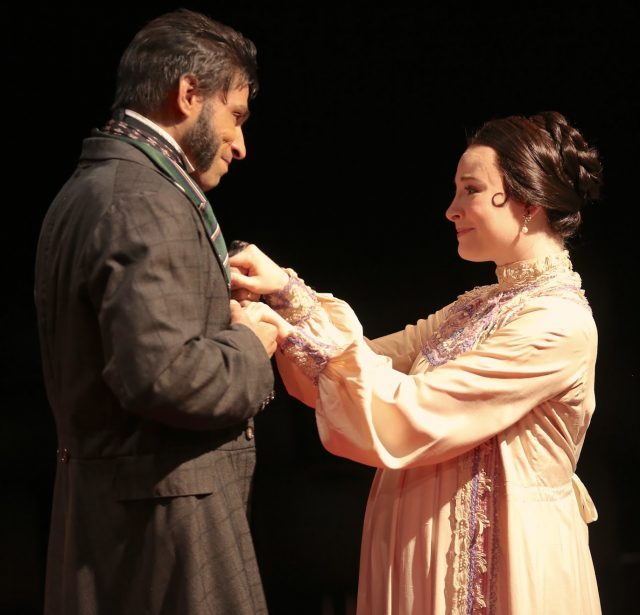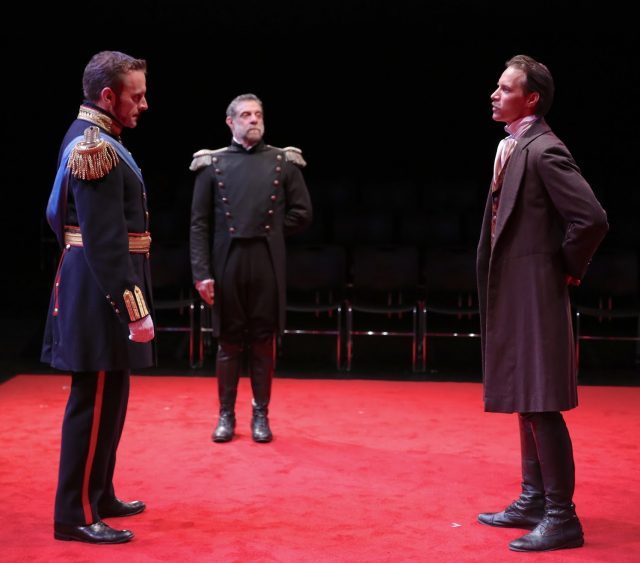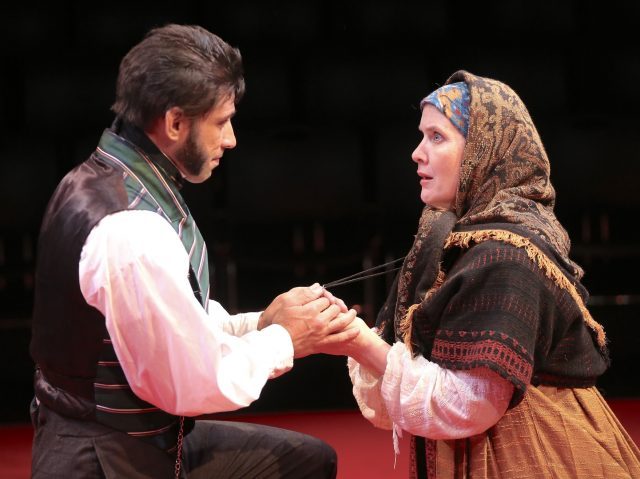
Alexander Pushkin (Ian Lassiter) and his wife, Natalya (Jenny Leona), get mixed up in court intrigue in world premiere play by Jonathan Leaf (photo by Carol Rosegg)
The Black Box Theater, the Sheen Center for Thought & Culture
18 Bleecker St. at Elizabeth St.
Thursday – Sunday through August 25, $57
212-925-2812
www.sheencenter.org
Jonathan Leaf’s fifth new play in eighteen months looks at the last three years in the life of Russian literary giant Alexander Pushkin. The works of Leo Tolstoy, Fyodor Dostoevsky, Ivan Turgenev, Boris Pasternak, Vladimir Nabokov, Anton Chekhov, and Nicolai Gogol might get more attention in America, but Pushkin, who is perhaps most well known for two novels that were turned into operas, Mussorgsky’s Boris Godunov and Tchaikovsky’s Eugene Onegin — and whose 1830 drama Mozart and Salieri was the basis of Peter Shaffer’s award-winning play and film, Amadeus — is widely considered Russia’s greatest poet, and his literary influence continues around the world. Written in verse (which you might not realize at first), Pushkin: A Life Played Out takes place from 1834 to 1837, shortly after the November Uprising, as Pushkin (Ian Lassiter) meets weekly with Tsar Nicholas I (Gene Gillette) and the monarch’s ever-loyal right-hand man, Count Benkendorf (Lou Liberatore), who edit Pushkin’s poetry and prose to make sure it fits their political agenda, since they believe that his earlier writings helped foment that rebellion, even if Pushkin denies that was his intention. Meanwhile, the court, including the tsar, Benkendorf, and Dutch ambassador and heartthrob Count D’Anthes (Christopher Kelly), have become enamored of Pushkin’s wife, Natalya (Jenny Leona). At first, Natalya is more interested in seeing her two sisters, Alexandra (Lexi Lapp) and Katarina (Olivia Gilliatt), married off, but slowly she appears to be more receptive to the court’s romantic interest, as Pushkin, an atheist, grows more stern and desperate, gambling at cards, fearing becoming a cuckold, and trying to finish Eugene Onegin, which he has not shown to the tsar.

Tsar Nicholas I (Gene Gillette), Count Benkendorf (Lou Liberatore), and Count D’Anthes (Christopher Kelly) plot strategy in Pushkin: A Life Played Out (photo by Carol Rosegg)
He further angers Nicholas by insisting the serfs be freed. “We advocate reform by lawful means. But I’ll bring him to end it — serfdom — soon,” Pushkin promises. Baron Delvig (Daniel Petzold) wants Pushkin to write about the current war, explaining to Natalya, “I’m just suggesting we might see the deaths — a line or two depicting how things are. He has the crown’s affection and concern —,” but Natalya responds, “Obedience is best.” Pushkin adds, “I can’t write lines to circulate in secret. Those days are gone. And would it matter anyway? The idea that my poems spurred the revolt: You admit, it’s absurd?” Pushkin’s friends, Delvig, Prince Dolgorukov (Michael Earle Fajardo), and Gogol (Kyle Cameron), attempt to keep him out of danger, but Pushkin is a determined man who strongly feels that the only noble way out of certain situations is via the duel.

Alexander Pushkin (Ian Lassiter) offers solace to his maid-servant in new play at Sheen Center (photo by Carol Rosegg)
Presented by the american vicarious and running at the Sheen Center for Though & Culture through August 25, Pushkin: A Life Played Out is expertly directed by Christopher McElroen (Piedmont Blues: A Search for Salutation, Waiting for Godot in New Orleans) on Troy Hourie’s spare set, between four rows of audience seats on two sides. Elivia Bovenzi has designed exquisite costumes, from regal formal wear and military garb to serf outfits worn by crewmembers who move about various tables, chairs, and desks in between scenes, all underneath a square, sometimes lighted temporary ceiling featuring handwritten quotes from Pushkin. However, most of what Pushkin says and recites in the show was created by Leaf (The Caterers, The Germans in Paris); in fact, the play features only three instances where Pushkin’s actual words are used, including the line “They only love the dead,” which Pushkin says to Gogol. Leaf and McElroen toss in a bit of Othello, as Pushkin deals with jealousy and is demeaned because of his part-African heritage. Lassiter (War Horse, An Octoroon) is sturdy and bold as Pushkin, his spectacular muttonchops practically a character all their own as he gets deeper into trouble. The rest of the cast is strong as well, from Tony nominee Liberatore’s (Burn This, As Is) stalwart portrayal of Benkendorf and Lapp’s (Aligator, STET) heartfelt Alexandra, who sees her brother-in-law as a heroic figure, to Tracy Sallows (Angels in America, The Audience), who plays the Pushkins’ serving-maid, with two sons who are among Alexander’s serfs, and Madame Goncharova, Natalya’s mother who wants only the best for her three daughters, two roles that emphasize the difference between rich and poor, serfdom and the aristocracy, and even males and females in Russian society. “No one’s free. You think that?” Gogol says early on to Pushkin. Delvig adds, “In Russia? In what ways are you free, Gogol?” He turns to Pushkin and says, “A dare: prove on your birthday that you’re free.” Of course, there is no easy answer in this taut, solid production.